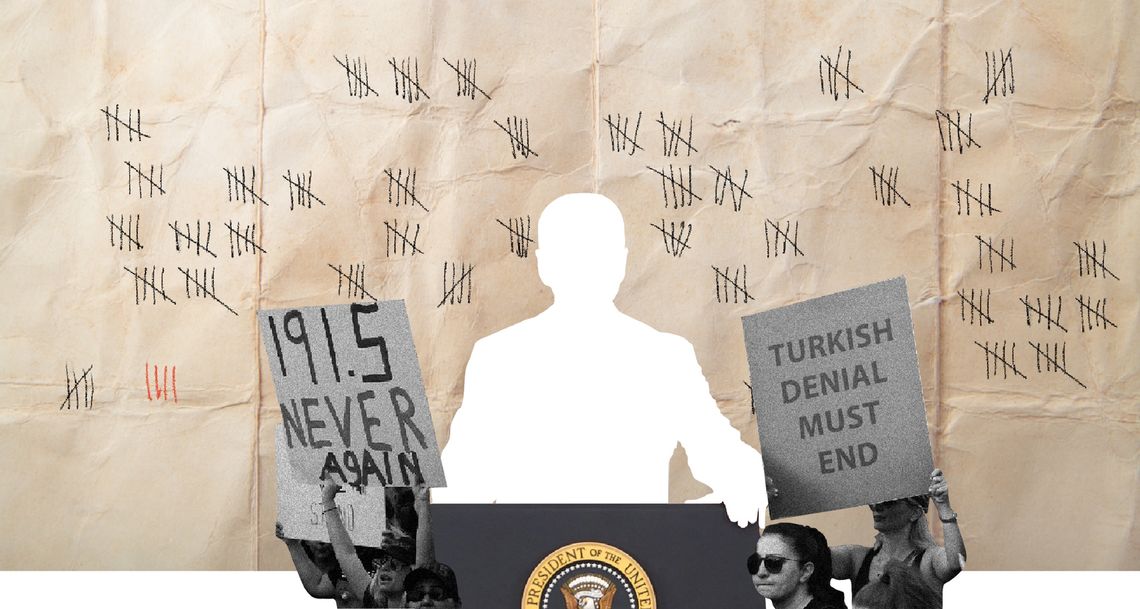

Illustration by Armine Shahbazyan.
On January 20, 2021, former Vice President Joseph R. Biden became the 46th President of the United States, following one of the most divisive elections in modern American history. President Biden and his national security and State Department teams face considerable foreign policy challenges ahead of them. After four years of selective disengagement by the United States in multilateral organizations under President Trump, President Biden and his team have proclaimed “unity” to be a top agenda priority–both domestically and abroad.
The most recent conflict that sparked international attention (although not action) was the 2020 Artsakh War. President Biden’s cadre of Obama-era foreign policy alumni, often referred to as the “blob” in Washington, is known for their public rhetoric expressing support for the respect of international norms, institutions and human rights. Given Azerbaijan’s recent violation of all three of these points, there is significant reason to believe the Biden Administration will take a more aggressive approach in the South Caucasus (at least rhetorically).
From the Top
President Biden’s Secretary of State, Antony Blinken, made clear in his confirmation hearings that, as a presidential candidate, “Biden pledged in his Remembrance Day [2020] statement to support a resolution recognizing the Armenian Genocide. Our Administration will be committed to prioritizing human rights and ensuring such a tragedy is not repeated.” Some of this rhetoric may sound familiar from the last time Biden was in the White House. Leading up to the 2008 campaign, Barack Obama had said he would not shy away from using the word “genocide” but then failed to do so once in office.
Alas, there is some room for optimism, given the trajectory Erdogan’s Turkey has been on the past few years, including increased malign military activity in Libya, Syria, Iraq and Nagorno-Karabakh to name just a few. Blinken went on to state the Administration will “reinvigorate U.S. engagement to find a permanent settlement to the Nagorno-Karabakh conflict that protects the security of Nagorno-Karabakh.” So far, the new American President has yet to directly contact President Erdogan. Nonetheless, following Biden’s accession to the presidency, Erdogan has begun attempts at reconciliation with America’s favored ally in the Middle East, the European Union and even purported outreach to Armenia. Turkey faces key challenges with the Biden Administration now in Washington, the most significant of which is their acquisition of the Russian-made S-400 missile defense system. The purchase resulted in minor sanctions being passed by the United States Congress in late 2020, which could increase if Erdogan remains recalcitrant. As a result, Turkey is also attempting to curry favor in Washington by dispatching veteran AKP founding member Murat Mercan as the new Turkish Ambassador to the United States. Although Turkey seeks some level of rapprochement with the EU and the United States, it appears to remain committed to pursuing an independent foreign policy for the time being.
Old Friends?
A familiar name in both Washington and Yerevan, Samantha Power, has also made her return to the Biden team as the Administrator of the United States Agency for International Development (USAID), a position that has been upgraded to a seat on the National Security Council. USAID has historically been linked and shown to cooperate with American intelligence operations. Power, who in 2013 was appointed the U.S. Ambassador to the United Nations by Barack Obama, continues to be a vocal advocate on the need to recognize the Armenian Genocide, which she was unfortunately not able to make happen during her time in the Obama Administration. Power is an ardent proponent of the Responsibility to Protect (R2P) doctrine, which seeks to normalize the practice of ensuring the international community never again fails to halt the mass atrocities of genocide, ethnic cleansing, war crimes and crimes against humanity. Unfortunately, this doctrine has turned out to be used quite selectively, resulting in criticism arising from its potential infringement on an individual nation’s sovereignty. One of the clearest examples can be seen in Libya, where Hillary Clinton, Susan Rice and Samantha Power were the chief advocates of intervention on humanitarian grounds in 2011, but which ultimately left the country in perpetual civil war and ongoing humanitarian crises for the last decade.
Trans-Atlantic Relations
Another interesting name to keep in mind is Amanda Sloat – selected as the National Security Council Director for Europe, which now includes the Caucasus. Sloat has most recently worked in the private sector for the Brookings Institute as a senior fellow and from 2013-2016 was the Deputy Assistant Secretary of State for Southern Europe and Eastern Mediterranean Affairs. Sloat has expertise in Turkey and trans-Atlantic relations, to name a few. An important change to note is that, as it regards the National Security Council, the Caucasus has now been lumped in with Europe, which could lead one to suspect a stronger push toward trans-Atlantic relations between the Eastern Partnership members of the EU and a potentially expanded NATO.
With the Democratic Party now marginally in control of Washington, the balancing against Russia’s influence in its so-called “near abroad” may become more apparent and even aggressive. Russia (and Turkey) have effectively found new footholds in the South Caucasus following the 2020 Artsakh War, which will likely lead Washington on an attempt to counter these new developments. As political analyst Eric Hacopian from CivilNet recently pointed out, “If there is one consensus figure, outside of Vladimir Putin, that is universally disliked in Washington, it’s Erdogan.” Although Armenia is connected to Russia historically and by the undeniable fate of geography, many believe that the Washington consensus on “countering Russian aggression” can be used to their benefit as it relates to Nagorno-Karabakh. However, consequences for such blatant outreach have yet to be fully realized in Armenia, although one only needs to look toward Georgia in 2008 for how Russia is willing to respond when its vital interests are at stake.
Anthony Barsamian, Co-Chair of the Armenian Assembly of America, says that President Biden worked with the Armenian community for 30 years during his time on the Senate Foreign Relations Committee as well as during his time as Vice President from 2008-2016. “Unfortunately, during the past four years, the United States was disengaged from the region,” he explains. “However, the Biden Administration will look at the Caucasus with a fresh eye.” Barsamian goes on to emphasize the crucial point that, “There is a serious potential for the United States to work with Russia in securing Armenia’s future and development as well as the South Caucasus more generally.”
Where to Go From Here
David L. Phillips, the Director of the Program on Peace-Building and Rights at the Institute for the Study of Human Rights at Columbia University, and his team recently produced a publication entitled, Artsakh Atrocities, offering documentation of human rights and foreign terrorist activities against Nagorno-Karabakh. Phillips, who presented his work to U.S. officials, says that “the Biden Administration should be considering sanctions against mercenaries, their Turkish sponsors, and Azerbaijani officials who paid for them to come to Azerbaijan and commit war crimes in Artsakh. Smart sanctions that target officials, restrict travel, and freeze overseas bank accounts would send a strong message that the United States is behind Artsakh and won’t tolerate war crimes.” Phillips is hopeful that the Artsakh Atrocities website can be used for accountability in the event that there are prosecutions of the perpetrators for their war crimes. “Even if that is not happening soon, in the future we will be disseminating data on crimes committed against Armenians and call on the international community to take the appropriate actions,” he explains.
In terms of how Armenia is handling the new administration in Washington, there is much still to be seen. However, an early warning sign is the potential selection of Lilit Makunts to replace the current Armenian Ambassador in Washington. In such trying times, a seasoned diplomat should be stationed in Washington. Makunts, a former Minister of Culture and currently head of the ruling My Step parliamentary caucus would be a political appointee who has no diplomatic experience. There can be no denying that these next four years will be crucial to the future successes (or shortcomings) of Armenia–potentially for decades to come. Armenian leadership should seek to re-engage Western leaders in the OSCE Minsk Group process to highlight Azerbaijan’s use of force to achieve territorial integrity in what was supposed to be a peaceful settlement process. As a result, the principle of self-determination of the people of Artsakh should be front and center, not excluding the fact that portions of Artsakh proper – Hadrut and Shushi – were emptied of their Armenian population. This should be a starting point for diplomatic engagement between Armenia and the Western powers. Edmond Azadian, a veteran columnist of the Armenian Mirror Spectator points out that the current ambassador to the U.S., Varuzhan Nersesyan, is a career diplomat. “It is the wrong move at the wrong time to downgrade your diplomatic representation at what is virtually the capital of the world,” he argues. “Unfortunately, this seems to be a pattern with Pashinyan in selecting his cadres at other ministries, too.”
Given that there are two Armenian-Americans among the Biden Administration and high-ranking officials, including President Biden himself, who have been vocal critics of Turkey and the 2020 Artsakh War, Armenians should seize this opportunity to secure their vital interests as it pertains to Nagorno-Karabakh and the Republic of Armenia’s territorial integrity and security.
On the Current Role of the Armed Forces and Civil Society in the Political Situation in Armenia
Armenia’s Constitution states that the Armed Forces must ensure the security, defense and territorial integrity of Armenia, as well as the inviolability of its borders. Intervention by the army in political processes is a violation of the principle of political neutrality and civilian control over them.
Read moreCan Trade Prevent War?
Given the growing sense of global multipolarity and the apparent twilight years of the American-anchored liberal international order, Armenia cannot solely rely on friends and allies around the globe to ensure its survival. A more realistic approach is necessary.
Read moreObservations on Armenia’s Current Socio-Political Situation
A concerted effort is needed to overcome the crisis the Armenian nation is facing. To do that, we need to understand where we are now, be honest, admit mistakes, learn lessons and move forward, writes Hovsep Kanadyan.
Read more



